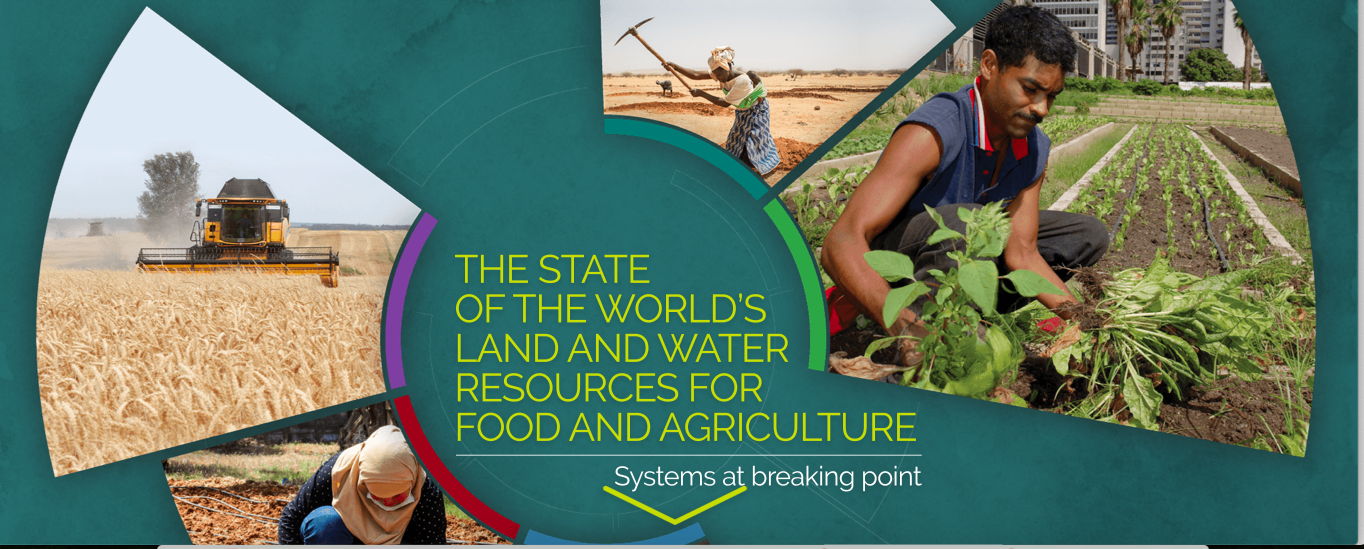FAO Report: State Of Worlds' Land And Water Resources
At A "Breaking Point"
10 Feb 2022 by The Water Diplomat
ROME, Italy

A new report by the UN warns that current agricultural practices are neither sustainable nor appropriate for today’s farming challenges.
The study concludes that technological advances are necessary to alleviate pressures stemming from climate change and to be able to provide food for a growing global population that is estimated to increase by two billion by 2050.
The SOLAW 2021 report (State of the world’s land and water resources for food and agriculture) aims to provide global, national and regional decision makers with, “solutions away from the business-as-usual approach, injecting a sense of urgency in making the necessary transformation at the roots of the global food systems.”
The study documents that if farming practices fail to become more sustainable, water withdrawals required for agriculture will have to increase by 35% to cater for the world’s growing population in the coming years. Failure to adapt could create potential catastrophes including conflict over food and water and environmental disasters.
The report also shows that growth in irrigation techniques and pesticide use are negatively impacting soil and water supplies, concluding that degradation of resources have forced food systems to reach a “breaking point.”
Use of irrigation is popular as it can produce up to three times the number of crops than rain fed systems. However, chemicals use contaminates groundwater and soil. The UN estimates that irrigation is responsible for 72% of groundwater withdrawals.
The report states that groundwater withdrawals for irrigation have increased from approximately 688 km3/year in 2010 to 820 km3/year in 2018, a 19% increase.
The study said: “Groundwater use is already constrained. It is intensively exploited in most principal continental aquifers and along highly productive coastal plains, where saline intrusion is a constant threat. Irrigated areas under stress correlate strongly with intensive groundwater use and depleting aquifers.”
The report added: “Modelling the impact on irrigated crop production indicates that groundwater depletion will continue to place severe constraints in East Asia, the Middle East–Western Asia, Northern America and South Asia.”
Another detail in the report explained that polluted water supplies adversely affect health and economic development stating, “agriculture has become the dominant source of pollution in many countries. Degrading water quality is a significant threat to food safety and food security.”
Use of “reactive nitrogen synthetic fertilizer” has increased from 81-110 million tonnes between 2000 and 2017, resulting in degradation of soil. Another area of concern is pollution deriving from pesticides and livestock pharmaceuticals with the report indicating, “there is currently little regulation or monitoring.”
The report offered four solutions that will help feed a growing population in the next 30 years as well as reduce green house emissions in agriculture.
The UN’s strategies stipulate that governmental polices concerning land and water governance must be more inclusive and integrated: “Multi-stakeholder and multidisciplinary approaches are critical in achieving integrated land and water management.”
The study also advised that adopting more creative technologies (that increase rainwater capture for example) and sustained investment is essential in combating food and water security.
The report said: “The high costs of degradation and inaction highlight the urgency to increase investments in sustainable land, soil and water management and in restoring degraded ecosystems.”
Related Topics
26 Oct 2021 NEW YORK NY, United States
UN-Water Expert Group warns that the pressure on freshwater resources will not relax Fair distribution will benefit those in greater need.
21 Jan 2021 ANKARA, Turkey
The causal factors behind Turkey’s water woes include persistently lower rainfall, inefficient water retention policies and wasteful practices in agriculture, municipal and domesti...
